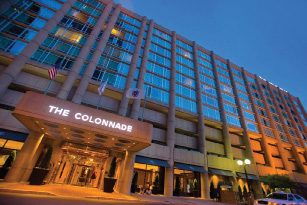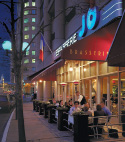- Home
- Media Kit
- Current Issue
- Past Issues
- Ad Specs-Submission
- Ad Print Settings
- Reprints (PDF)
- Photo Specifications (PDF)
- Contact Us

![]()
ONLINE

A People Business
Editors’ Note
David Colella is Chairman of the Greater Boston Convention & Visitors Bureau and Vice President of the Massachusetts Restaurant Association. He sits on the boards of the University of Massachusetts Department of Hospitality and Tourism Management, First Night Boston, and Skal Club International, Boston. Colella is a graduate of the Isenberg School of Management at the University of Massachusetts-Amherst. In addition to his current post, which he has held since December 1992, Colella is Vice President of Hotel Operations for The Druker Company Ltd., The Colonnade’s parent company that owns and operates two additional Boston hotels. He was named Massachusetts Restaurant Association’s Restaurateur of the Year in 2008 and he was recently inducted into the Massachusetts Lodging Association’s Hall of Fame.
Property Brief
The Colonnade Hotel (www.colonnadehotel.com) is an independently owned and managed luxury property situated in Boston’s Back Bay and featuring 285 sophisticated rooms and suites with 21st-Century comforts and amenities that are both high-tech and soft touch. The property is home to the city’s only rooftop pool – acclaimed in national and international media – and Brasserie Jo, one of Boston’s most popular restaurants. Opened in 1971 by Bertram Druker, the hotel is overseen today by his son Ronald Druker, President of The Druker Company.
Have you seen business stabilizing and what is your outlook for business coming back?
The good news is that the decline has stopped. Business has begun to stabilize. In addition, we’re starting to see some growth – small growth has returned in some markets. Rather than a rebound which has been characteristic of past recession recoveries, we’re seeing a slow, steady climb toward healthy business levels. As we look forward, we’re seeing pockets of opportunity.
The leisure market is one where Boston, like other major cities, can and has found ways to create demand. We’ve been doing that for the past year-and-a-half. Where we need to see improvement going forward is in the corporate transient market, the corporate meetings market, and the attendees at trade shows and conventions. We want to see these segments come back in numbers.
We have seen some increases to the corporate group market as companies are starting to say “let’s get back to meeting again.” They’re being selective on type of hotel and cautious in terms of rate, but we’re seeing some of that come back and The Colonnade is well positioned both from an image and a rate standpoint.

The Colonnade Entrance
After your recent renovation,
do you foresee any additional changes taking place?
Very few, in terms of the product that our guests see, feel, and touch. We have set the mark now for The Colonnade; it’s where it needs to be and we’ve positioned it properly. The product can compete with any hotel in the market now, at any level and, often, at greater value. Our rooms and meeting space, and function space, are top notch.
We’re now planning investment that includes infrastructure improvements to enhance operating efficiencies and energy conservation. In 2010, we invested over a million dollars in conservation investments that will have incredibly short paybacks and will also reduce our carbon footprint. We’re putting a lot of energy and time into those efforts now.
During challenging times, how do you make cuts without the guest noticing?
It is a tough balance. We’re asking employees to deliver more at a higher level of service.
Most hotel operators at any level understand that ours is a people business, so when we are forced to reduce staff based on business levels, we keep a sharp eye on the impact on our guests. There’s a greater presence of managers at the front of the house and we’re more involved with our guests than ever before.
There are two metrics to measure it: our scores on Trip Advisor and our scores on comment cards from guests. In the past two years, our scores have improved. Does that mean we’re doing a better job? I think so. And in some cases, we’re doing it with less. That is part of the new reality.
It doesn’t mean that guests are lowering their expectations. We find ways to satisfy the guests and deliver as we have in the past.

Brasserie Jo
Are you happy with your food and beverage today? How were you able to find the right niche for Brasserie Jo, which also fits as a community restaurant?
Brasserie Jo is a freestanding restaurant. It is our restaurant, we do operate it, and it is a legitimate French Brasserie providing a great value and a large menu. You can return often and have many choices. It’s open 20 hours a day. It appeals to so many people, guests and residents alike, and has a casual feel.
Also, we are well located in the heart of Boston, in the Back Bay, where there is so much activity, like shopping, theater, symphony, and many businesses. There are great neighborhoods like South End, all within walking distance, as well as a number of luxury condominiums and apartments. A restaurant of our caliber becomes part of the neighborhood. It has a very loyal following.
We tweak it to keep it fresh. We make interesting menu changes and we recently started the Brasserie Jo Martini Club, which now has upwards of 600 members. We are also developing a wine club. We’ve added sizzle with periodic fashion shows and we’ve engaged our restaurant patrons through social networking sites like Twitter and Facebook, which we also use for the hotel.
How critical is it during difficult periods to have an owner who is invested in the property and with whom you have a common philosophy?
It is critical from day one – as much so through strong economic periods as difficult ones. Most important is that the general manager and the owner have a shared vision, and Ron and I do. We are in constant contact with each other as we seek new ways to articulate that vision within the hotel. It is a partnership in many ways.
You are coming up on 18 years at the hotel. What keeps the business fresh for you?
I started out with a passion for hospitality, and it’s been my life and my career. I own that passion and it’s not something I am likely to lose. There are so many touch points along the way that stoke that passion – whether it’s the challenge of dealing with a downturn in the economy, the opportunity that comes with an upswing in business, supporting the Boston community, or working with the young people we keep hiring into this business. I feel like I was born to be in hospitality and I thrive on it. It’s as simple as that.•